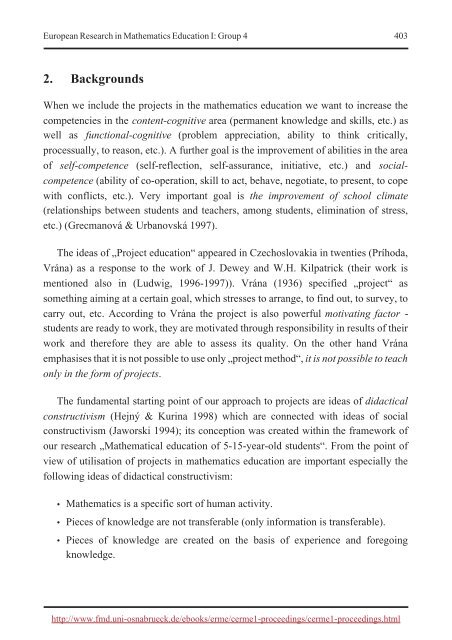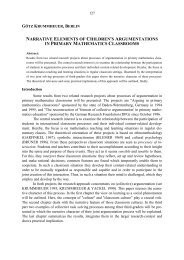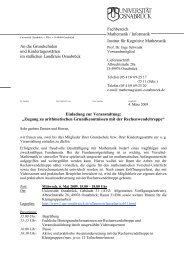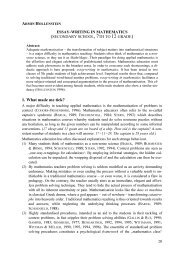- Page 1 and 2:
in European Research Mathematics Ed
- Page 3 and 4:
European Research in Mathematics Ed
- Page 5 and 6:
European Research in Mathematics Ed
- Page 7 and 8:
European Research in Mathematics Ed
- Page 9 and 10:
European Research in Mathematics Ed
- Page 11 and 12:
European Research in Mathematics Ed
- Page 13 and 14:
European Research in Mathematics Ed
- Page 15 and 16:
European Research in Mathematics Ed
- Page 17 and 18:
European Research in Mathematics Ed
- Page 19 and 20:
European Research in Mathematics Ed
- Page 21 and 22:
European Research in Mathematics Ed
- Page 23 and 24:
European Research in Mathematics Ed
- Page 25 and 26:
European Research in Mathematics Ed
- Page 27 and 28:
European Research in Mathematics Ed
- Page 29 and 30:
European Research in Mathematics Ed
- Page 31 and 32:
European Research in Mathematics Ed
- Page 33 and 34:
European Research in Mathematics Ed
- Page 35 and 36:
European Research in Mathematics Ed
- Page 37 and 38:
European Research in Mathematics Ed
- Page 39 and 40:
European Research in Mathematics Ed
- Page 41 and 42:
European Research in Mathematics Ed
- Page 43 and 44:
European Research in Mathematics Ed
- Page 45 and 46:
European Research in Mathematics Ed
- Page 47 and 48:
European Research in Mathematics Ed
- Page 49 and 50:
European Research in Mathematics Ed
- Page 51 and 52:
European Research in Mathematics Ed
- Page 53 and 54:
European Research in Mathematics Ed
- Page 55 and 56:
European Research in Mathematics Ed
- Page 57 and 58:
European Research in Mathematics Ed
- Page 59 and 60:
European Research in Mathematics Ed
- Page 61 and 62:
European Research in Mathematics Ed
- Page 63 and 64:
European Research in Mathematics Ed
- Page 65 and 66:
European Research in Mathematics Ed
- Page 67 and 68:
European Research in Mathematics Ed
- Page 69 and 70:
European Research in Mathematics Ed
- Page 71 and 72:
European Research in Mathematics Ed
- Page 73 and 74:
European Research in Mathematics Ed
- Page 75 and 76:
European Research in Mathematics Ed
- Page 77 and 78:
European Research in Mathematics Ed
- Page 79 and 80:
European Research in Mathematics Ed
- Page 81 and 82:
European Research in Mathematics Ed
- Page 83 and 84:
European Research in Mathematics Ed
- Page 85 and 86:
European Research in Mathematics Ed
- Page 87 and 88:
European Research in Mathematics Ed
- Page 89 and 90:
European Research in Mathematics Ed
- Page 91 and 92:
European Research in Mathematics Ed
- Page 93 and 94:
European Research in Mathematics Ed
- Page 95 and 96:
European Research in Mathematics Ed
- Page 97 and 98:
European Research in Mathematics Ed
- Page 99 and 100:
European Research in Mathematics Ed
- Page 101 and 102:
European Research in Mathematics Ed
- Page 103 and 104:
European Research in Mathematics Ed
- Page 105 and 106:
European Research in Mathematics Ed
- Page 107 and 108:
European Research in Mathematics Ed
- Page 109 and 110:
European Research in Mathematics Ed
- Page 111 and 112:
European Research in Mathematics Ed
- Page 113 and 114:
European Research in Mathematics Ed
- Page 115 and 116:
European Research in Mathematics Ed
- Page 117 and 118:
European Research in Mathematics Ed
- Page 119 and 120:
European Research in Mathematics Ed
- Page 121 and 122:
European Research in Mathematics Ed
- Page 123 and 124:
European Research in Mathematics Ed
- Page 125 and 126:
European Research in Mathematics Ed
- Page 127 and 128:
European Research in Mathematics Ed
- Page 129 and 130:
European Research in Mathematics Ed
- Page 131 and 132:
European Research in Mathematics Ed
- Page 133 and 134:
European Research in Mathematics Ed
- Page 135 and 136:
European Research in Mathematics Ed
- Page 137 and 138:
European Research in Mathematics Ed
- Page 139 and 140:
European Research in Mathematics Ed
- Page 141 and 142:
European Research in Mathematics Ed
- Page 143 and 144:
European Research in Mathematics Ed
- Page 145 and 146:
European Research in Mathematics Ed
- Page 147 and 148:
European Research in Mathematics Ed
- Page 149 and 150:
European Research in Mathematics Ed
- Page 151 and 152:
European Research in Mathematics Ed
- Page 153 and 154:
European Research in Mathematics Ed
- Page 155 and 156:
European Research in Mathematics Ed
- Page 157 and 158:
European Research in Mathematics Ed
- Page 159 and 160:
European Research in Mathematics Ed
- Page 161 and 162:
European Research in Mathematics Ed
- Page 163 and 164:
European Research in Mathematics Ed
- Page 165 and 166:
European Research in Mathematics Ed
- Page 167 and 168:
European Research in Mathematics Ed
- Page 169 and 170:
European Research in Mathematics Ed
- Page 171 and 172:
European Research in Mathematics Ed
- Page 173 and 174:
European Research in Mathematics Ed
- Page 175 and 176:
European Research in Mathematics Ed
- Page 177 and 178:
European Research in Mathematics Ed
- Page 179 and 180:
European Research in Mathematics Ed
- Page 181 and 182:
European Research in Mathematics Ed
- Page 183 and 184:
European Research in Mathematics Ed
- Page 185 and 186:
European Research in Mathematics Ed
- Page 187 and 188:
European Research in Mathematics Ed
- Page 189 and 190:
European Research in Mathematics Ed
- Page 191 and 192:
European Research in Mathematics Ed
- Page 193 and 194:
European Research in Mathematics Ed
- Page 195 and 196:
European Research in Mathematics Ed
- Page 197 and 198:
European Research in Mathematics Ed
- Page 199 and 200:
European Research in Mathematics Ed
- Page 201 and 202:
European Research in Mathematics Ed
- Page 203 and 204:
European Research in Mathematics Ed
- Page 205 and 206:
European Research in Mathematics Ed
- Page 207 and 208:
European Research in Mathematics Ed
- Page 209 and 210:
European Research in Mathematics Ed
- Page 211 and 212:
European Research in Mathematics Ed
- Page 213 and 214:
European Research in Mathematics Ed
- Page 215 and 216:
European Research in Mathematics Ed
- Page 217 and 218:
European Research in Mathematics Ed
- Page 219 and 220:
European Research in Mathematics Ed
- Page 221 and 222:
European Research in Mathematics Ed
- Page 223 and 224:
European Research in Mathematics Ed
- Page 225 and 226:
European Research in Mathematics Ed
- Page 227 and 228:
European Research in Mathematics Ed
- Page 229 and 230:
European Research in Mathematics Ed
- Page 231 and 232:
European Research in Mathematics Ed
- Page 233 and 234:
European Research in Mathematics Ed
- Page 235 and 236:
European Research in Mathematics Ed
- Page 237 and 238:
European Research in Mathematics Ed
- Page 239 and 240:
European Research in Mathematics Ed
- Page 241 and 242:
European Research in Mathematics Ed
- Page 243 and 244:
European Research in Mathematics Ed
- Page 245 and 246:
European Research in Mathematics Ed
- Page 247 and 248:
European Research in Mathematics Ed
- Page 249 and 250:
European Research in Mathematics Ed
- Page 251 and 252:
European Research in Mathematics Ed
- Page 253 and 254:
European Research in Mathematics Ed
- Page 255 and 256:
European Research in Mathematics Ed
- Page 257 and 258:
European Research in Mathematics Ed
- Page 259 and 260:
European Research in Mathematics Ed
- Page 261 and 262:
European Research in Mathematics Ed
- Page 263 and 264:
European Research in Mathematics Ed
- Page 265 and 266:
European Research in Mathematics Ed
- Page 267 and 268:
European Research in Mathematics Ed
- Page 269 and 270:
European Research in Mathematics Ed
- Page 271 and 272:
European Research in Mathematics Ed
- Page 273 and 274:
European Research in Mathematics Ed
- Page 275 and 276:
European Research in Mathematics Ed
- Page 277 and 278:
European Research in Mathematics Ed
- Page 279 and 280:
European Research in Mathematics Ed
- Page 281 and 282:
European Research in Mathematics Ed
- Page 283 and 284:
European Research in Mathematics Ed
- Page 285 and 286:
European Research in Mathematics Ed
- Page 287 and 288:
European Research in Mathematics Ed
- Page 289 and 290:
European Research in Mathematics Ed
- Page 291 and 292:
European Research in Mathematics Ed
- Page 293 and 294:
European Research in Mathematics Ed
- Page 295 and 296:
European Research in Mathematics Ed
- Page 297 and 298:
European Research in Mathematics Ed
- Page 299 and 300:
European Research in Mathematics Ed
- Page 301 and 302:
European Research in Mathematics Ed
- Page 303 and 304:
European Research in Mathematics Ed
- Page 305 and 306:
European Research in Mathematics Ed
- Page 307 and 308:
European Research in Mathematics Ed
- Page 309 and 310:
European Research in Mathematics Ed
- Page 311 and 312:
European Research in Mathematics Ed
- Page 313 and 314:
European Research in Mathematics Ed
- Page 315 and 316:
European Research in Mathematics Ed
- Page 317 and 318:
European Research in Mathematics Ed
- Page 319 and 320:
European Research in Mathematics Ed
- Page 321 and 322:
European Research in Mathematics Ed
- Page 323 and 324:
European Research in Mathematics Ed
- Page 325 and 326:
European Research in Mathematics Ed
- Page 327 and 328:
European Research in Mathematics Ed
- Page 329 and 330:
European Research in Mathematics Ed
- Page 331 and 332:
European Research in Mathematics Ed
- Page 333 and 334:
European Research in Mathematics Ed
- Page 335 and 336:
European Research in Mathematics Ed
- Page 337 and 338:
European Research in Mathematics Ed
- Page 339 and 340:
European Research in Mathematics Ed
- Page 341 and 342:
European Research in Mathematics Ed
- Page 343 and 344:
European Research in Mathematics Ed
- Page 345 and 346:
European Research in Mathematics Ed
- Page 347 and 348:
European Research in Mathematics Ed
- Page 349 and 350:
European Research in Mathematics Ed
- Page 351 and 352: European Research in Mathematics Ed
- Page 353 and 354: European Research in Mathematics Ed
- Page 355 and 356: European Research in Mathematics Ed
- Page 357 and 358: European Research in Mathematics Ed
- Page 359 and 360: European Research in Mathematics Ed
- Page 361 and 362: European Research in Mathematics Ed
- Page 363 and 364: European Research in Mathematics Ed
- Page 365 and 366: European Research in Mathematics Ed
- Page 367 and 368: European Research in Mathematics Ed
- Page 369 and 370: European Research in Mathematics Ed
- Page 371 and 372: European Research in Mathematics Ed
- Page 373 and 374: European Research in Mathematics Ed
- Page 375 and 376: European Research in Mathematics Ed
- Page 377 and 378: European Research in Mathematics Ed
- Page 379 and 380: European Research in Mathematics Ed
- Page 381 and 382: European Research in Mathematics Ed
- Page 383 and 384: European Research in Mathematics Ed
- Page 385 and 386: European Research in Mathematics Ed
- Page 387 and 388: European Research in Mathematics Ed
- Page 389 and 390: European Research in Mathematics Ed
- Page 391 and 392: European Research in Mathematics Ed
- Page 393 and 394: European Research in Mathematics Ed
- Page 395 and 396: European Research in Mathematics Ed
- Page 397 and 398: European Research in Mathematics Ed
- Page 399 and 400: European Research in Mathematics Ed
- Page 401: European Research in Mathematics Ed
- Page 405 and 406: European Research in Mathematics Ed
- Page 407 and 408: European Research in Mathematics Ed
- Page 409 and 410: European Research in Mathematics Ed
- Page 411 and 412: European Research in Mathematics Ed
- Page 413 and 414: European Research in Mathematics Ed
- Page 415 and 416: European Research in Mathematics Ed
- Page 417: European Research in Mathematics Ed





